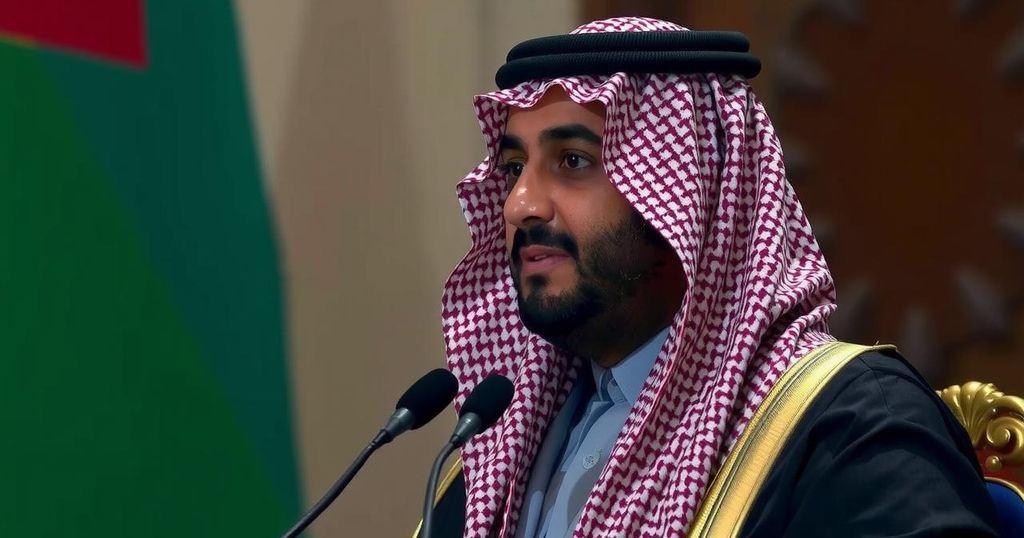Saudi Crown Prince Mohammed bin Salman condemned Israel’s military actions in Gaza as “genocide” during a summit, uniting Arab leaders in demanding withdrawal from the West Bank and Gaza. Foreign Minister Prince Faisal bin Farhan Al-Saud criticized the international community’s inaction on the conflict. The resurgence of Donald Trump into politics adds a new dynamic to regional relations and hope for conflict resolution.
Saudi Crown Prince Mohammed bin Salman has expressed strong condemnation of Israel’s military actions in Gaza, characterizing them as “genocide.” This significant criticism by a Saudi official was articulated during a recent summit attended by Muslim and Arab leaders, where the Crown Prince also condemned Israel’s actions against Lebanon and Iran. Furthermore, he cautioned Israel against conducting military operations on Iranian territory, signaling a potential shift in regional dynamics between Saudi Arabia and Tehran. Additionally, other leaders present at the summit united in their calls for a complete Israeli withdrawal from both the West Bank and Gaza. Saudi Arabia’s Foreign Minister, Prince Faisal Bin Farhan Al-Saud, asserted that the ongoing crisis reflects a monumental failure of the international community, stating, “Where the international community primarily has failed is ending the immediate conflict and putting an end to Israel’s aggression.” The conflict in Gaza was ignited by a Hamas-led incursion into southern Israel on October 7, 2023, which resulted in the deaths of approximately 1,200 individuals and numerous hostages. In retaliation, Israel initiated extensive military operations aimed at dismantling Hamas, leading to staggering casualties in Gaza, with over 43,400 fatalities reported by Hamas-linked health authorities. A United Nations report highlighted that nearly 70% of verified victims were women and children, underscoring the humanitarian crisis. Leaders at the summit also expressed concern over Israel’s alleged continuous attacks on United Nations personnel and facilities in Gaza, further exacerbating the humanitarian situation. In a notable legislative move, the Israeli Knesset passed a bill prohibiting the UN Palestinian refugee agency, Unrwa, from operating within Israeli borders and occupied territories, an action that has drawn criticism from several governments, including the United States and the United Kingdom, regarding its implications for humanitarian aid. In the context of a politically charged atmosphere, the imminent return of Donald Trump to the White House looms large. Gulf leaders, cognizant of Trump’s historical support for Israel yet possessing established rapport with him, are hopeful that he will leverage his influence to facilitate conflict resolution in the region. Unlike President Biden, Trump is viewed more favorably in Saudi Arabia; however, his mixed legacy in the Middle East, marked by both contentious decisions and diplomatic breakthroughs, remains a point of contention. An editorial in a prominent Saudi publication encapsulated this sentiment, titled “A New Era of Hope: Trump’s Return and the Promise of Stability.”
The tensions between Israel and Palestine, particularly in Gaza, have been exacerbated by significant military conflicts. The most recent escalation began with a violent Hamas attack in October 2023, leading to severe Israeli retaliation. The humanitarian crisis in Gaza has drawn considerable international attention, compelling regional leaders to voice their concerns publicly. Saudi Arabia, historically a pivotal player in Middle Eastern politics, is now navigating complex relationships both within the region and with external powers such as the United States, especially with the changing dynamics due to the potential return of Donald Trump to the presidency.
In conclusion, Saudi Crown Prince Mohammed bin Salman’s severe denunciation of Israel’s actions in Gaza, characterized as “genocide,” reflects a critical stance amidst a complex geopolitical landscape. The call for a united front against Israeli aggression by Arab leaders indicates an evolving strategy for the region, particularly in light of the upcoming U.S. political shifts. As humanitarian crises continue, calls for international accountability and resolution will likely take center stage in future diplomatic discussions.
Original Source: www.bbc.co.uk






